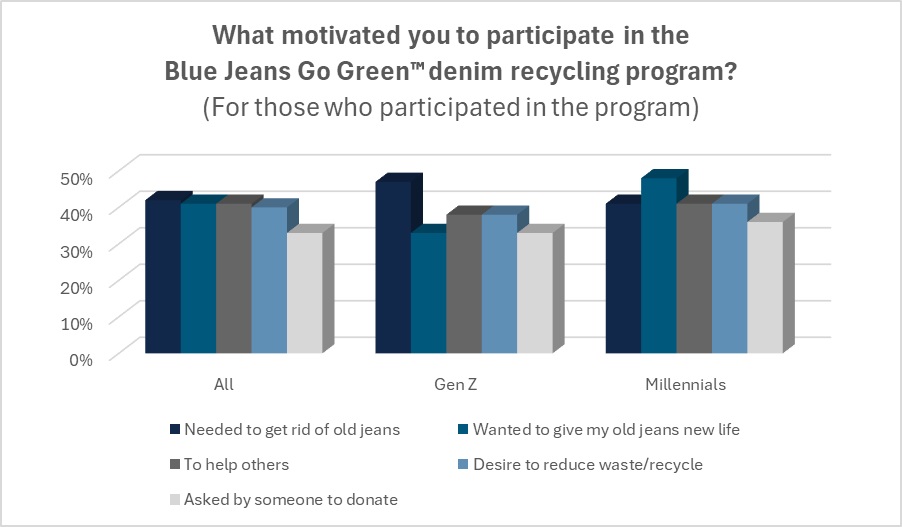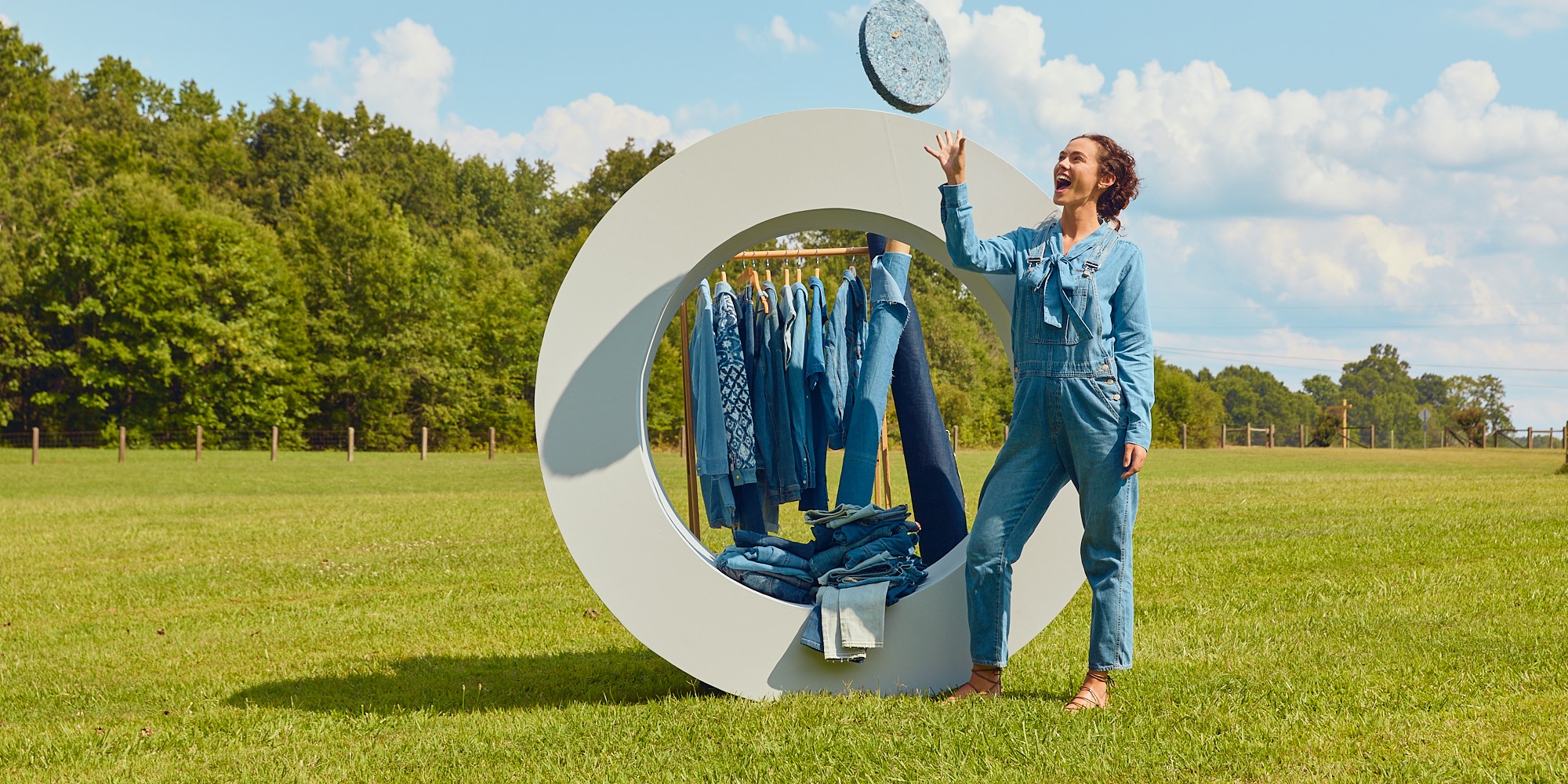Just four years ago when the pandemic was raging, pajamas and sweatpants became the go-to garments all day, every day and the industry wondered about the future of denim. Though it may have been rocked, denim emerged from COVID’s ashes like a fashion boss, proving it’s strength as an iconic clothing category. Not only do consumers appreciate its style and durability but these days, brands and shoppers alike recognize cotton denim can be part of their own sustainability efforts thanks to growing recycling and resale programs.
One such brand is Montreal-based Frank and Oak. In an interview with the Lifestyle Monitor™, Stephanie Noël, head of product design and marketing, said that since 2017, Frank and Oak’s team of designers has made it a priority to lessen the negative impact of its industry on “the planet we call home.”
Most consumers seek out key features such as durability, quality, versatility and comfort above all else when they are buying new jeans.
Melissa Bastos, Director of Corporate Strategy & Insights, Cotton Incorporated
“This has motivated us to develop every product with a circular mindset,” Noël says. “Today, 100 percent of our assortment is responsible – meaning each product contains low-impact, cruelty-free, organic, biodegradable, recycled fibers to have the lowest possible footprint on the planet at the end of its lifecycle. We have pioneered in developing a completely circular denim collection meaning that all of our denim is designed to be easily recycled and is made using conscious materials (organic cotton or recycled materials originating from salvaged fibers and mindful production methods). This is why participating in the Blue Jeans Go Green™ program since 2022 has been a priority of ours.”
Noël is referring to Cotton Incorporated’s Blue Jeans Go Green™ (BJGG) denim recycling program, where consumers, brands and retailers come together to give new purpose to old denim. Through the program, consumers recycle worn denim that’s made from 90 percent cotton or greater at a participating retailer or a collection event, or mail it in through Zappos for Good.
The used denim is converted into new products such as building insulation, pet bed inserts, and sustainable packaging for the food and pharmaceutical industries. These new products come about thanks to a collaboration between Cotton Incorporated and Bonded Logic, Inc., a leading natural cotton fiber insulation manufacturer. Through the BJGG program, consumers can feel good about keeping their used denim out of landfills, often while receiving money or a percentage off a new pair of jeans.
Ariat joined the Blue Jeans Go Green™ program in 2019. It was first implemented at two Ariat brand shop locations but has since expanded across Ariat’s fleet of brand shops and outlets, as well as one of its retail partners, JAX Outdoor, according to Ariat’s Kelly Coffey, director of brand store marketing.
“At Ariat, we value the land on which we work, live and play,” Coffey said in an interview with the Lifestyle Monitor™. “We are proud to have joined forces with Cotton’s Blue Jeans Go Green™ denim recycling program as it aligns with Ariat’s initiatives to protect our planet. This collaboration helps us keep textile waste out of landfills and repurposes old jeans as an effective insulation solution. To date, with our customer’s participation at retail, Ariat has helped keep over 7 tons of denim out of landfills and has helped produce close to 30,000 square feet of natural cotton fiber insulation.”
Anthropologie is another retailer that has been collaborating with the Blue Jeans Go Green™ program.
“At Anthropologie, we are committed to creating a more sustainable future and being mindful of our environmental impact on the planet across our business operations,” said Elizabeth Preis, Anthropologie Group’s global chief marketing officer, in a statement announcing the retailer’s commitment to the program. “We are thrilled to be growing our participation with Cotton’s Blue Jeans Go Green™ program and to bring our incredibly loyal community along to join in our sustainability efforts. I am confident that through this relationship, we will grow Anthropologie’s denim circularity initiative, support in waste reduction and reduce our overall environmental impact.”
American Eagle Outfitters also participates in the BJGG program, giving consumers who recycle a used denim garment $10 off the purchase of a new pair of jeans.
“At AEO we focus on youth and their optimism toward the future, so building a better world for generations to come is fundamental to our brands, values and purpose,” commented Jay Schottenstein, executive chairman and CEO, when the company unveiled pre-pandemic sustainability goals in 2019.
Consumers feel part of that better world involves cotton denim, according to Cotton Incorporated’s Melissa Bastos, director of corporate strategy and insights.
“Consumers tell us their denim jeans have a long wardrobe lifecycle, keeping a pair for an average of six years, only replacing when they are worn out or when they no longer fit,” Bastos says. “So, most consumers seek out key features such as durability, quality, versatility and comfort above all else when they are buying new jeans.”
“Consumers also consider long-lasting clothing to be better for the environment and our research shows that cotton denim jeans last the longest in consumers’ closets,” Bastos continues. “Cotton is the fiber shoppers most associate with these attributes, unlike jeans made with synthetic or manmade fibers. More than half of consumers say they expect their denim jeans (53 percent) to last a year or more if they are made from cotton versus synthetic or manmade fibers (Cotton Council International and Cotton Incorporated’s Durability Survey, 2020) And 86 percent of consumers say cotton/cotton spandex jeans are the most comfortable compared to jeans made with manmade fibers like polyester and rayon, which is one of the major reasons why the majority prefer their denim jeans to be made of 100 percent cotton or cotton with stretch.”
Brands and retailers stand to benefit from meeting this preference for cotton denim, as two-fifths of consumers (41 percent) say they are wearing denim jeans more often compared to last year, according to the Cotton Incorporated Lifestyle Monitor™ Survey. Additionally, 86 percent of consumers say they plan to purchase the same or more pairs of denim jeans in the next year than they did in the previous one.
Brands might keep in mind that consumers trust denim that’s made of cotton. When surveyed, 79 percent of consumers say cotton and cotton-blended clothing is the most durable/longest lasting compared to polyester (36 percent) and rayon (19 percent), according to Monitor™ research. Another 83 percent say cotton is the most sustainable clothing, eclipsing polyester (23 percent) and rayon (16 percent). And 86 percent of consumers trust cotton denim because they say cotton clothing does not irritate their skin compared to polyester (31 percent) and rayon (18 percent).
There is also an expectation that denim is made of cotton, with the majority of consumers (61 percent) saying jeans are made from the natural fiber, according to the Monitor™ research. And nearly half of all consumers (49 percent) say they usually or always check the fiber content information before buying a pair of denim jeans.
Cotton Incorporated’s Andrea Samber, director of brand partnerships, points out that denim recycling is made possible because it’s made from cotton, which is a sustainable, natural fiber.
So far, the Blue Jeans Go Green™ program has collected more than 5.2 million pieces of denim – meaning more than 2,630 tons of denim has been diverted from landfills.
Nearly two-fifths of consumers (37 percent) say they have heard of or participated in the Blue Jeans Go Green™ program, according to Cotton Incorporated’s 2023 Consumer Circularity Survey. The reasons for participating in the BJGG program include needing to get rid of old jeans (42 percent), wanting to give their old jeans new life (41 percent), helping others (41 percent), and reducing waste/recycling (40 percent).

The BJGG program appeals to consumers who want to see their old denim go to good use. Consider that when consumers no longer plan to wear their denim jeans, the majority (58 percent) say they typically donate them to charity while 48 percent give their jeans away, according to the 2023 Consumer Circularity Survey. Compare that to 23 percent who throw them away and 18 percent who just keep them.
Besides recycling, cotton denim can see a second life through resale, renewal, and upcycling. Such initiatives make sense when one considers some of the main reasons consumers stop wearing their denim is the jeans no longer fit (54 percent), they just don’t want them anymore (18 percent), or they’re out of style (15 percent), according to the 2023 Consumer Circularity Survey. These reasons make them perfect for resale. Another 42 percent of consumers say holes or tears stop them from wearing their jeans, followed by faded color (21 percent) – meaning the jeans can find new life through renewal or upcycling efforts.
Ariat’s website encourages customers to find new uses for their old denim, such as learning how to patch their ripped jeans, or upcycle worn jeans into denim shorts. The brand also shows consumers how to breathe new life into their old denim by altering it, such as by letting down a hem or adding side slits at the cuff.
Carhartt, another BJGG participant, also has programs like Carhartt Reworked and Repair that aim to keep worn gear working even longer.
“Through Carhartt Reworked specifically, consumers can trade in their previously worn Carhartt denim, outerwear, bib overalls, sweatshirts, etc., that meet condition standards and have it available for purchase for people who can put it to good use, or have it properly recycled or donated to keep fabric out of landfills,” Carhartt’s Gretchen Valade, director of sustainability, told the Lifestyle Monitor™ in an interview last year. “For eligible gear that can still be worn, we offer consumers Carhartt digital gift cards as incentive for their trade-in.”
Madewell, another BJGG collaborator, also gives pre-worn apparel a second life through its Madewell Forever program. Consumers send their used jeans, tee shirts, and more to thredUP, where the garment’s condition is assessed. Pieces that still have life left in them are listed on Madewell Forever to be sold to a new owner. Denim that is too worn is repurposed in the Blue Jeans Go Green™ program. Wearable clothes that don’t make Madewell’s cut go to thredUP’s Rescue program, while the rest are sent to thrift stores and textile recyclers.
As Cotton Incorporated’s Samber reminds, the circularity of denim starts with cotton. This natural, sustainable fiber is the perfect material to create durable, stylish denim – and so much more.
